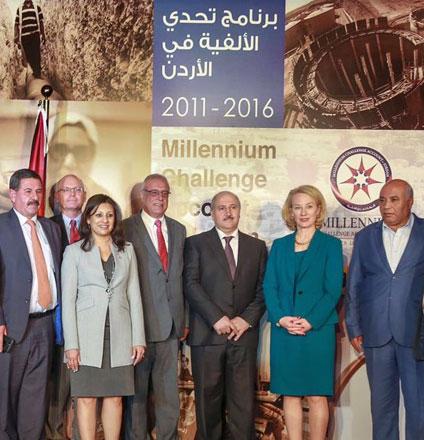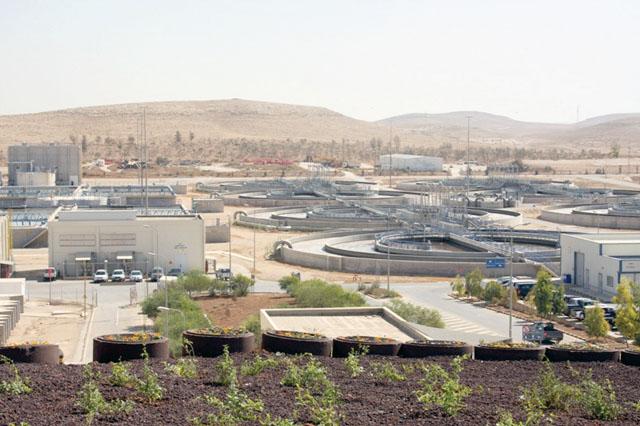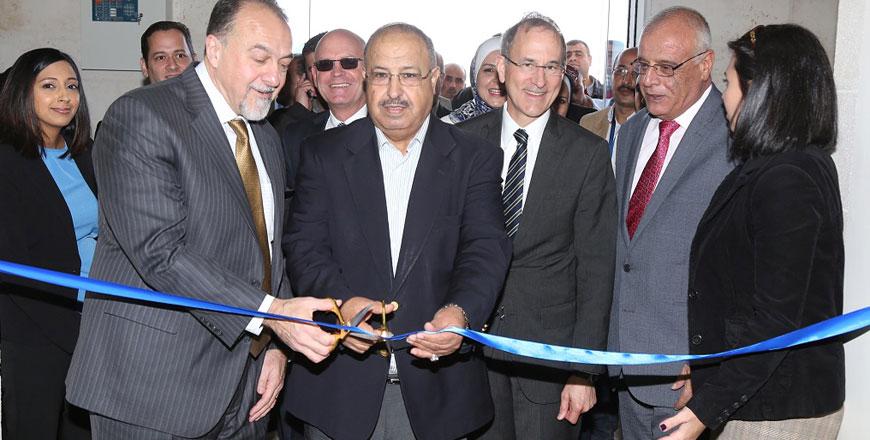You are here
US-funded Zarqa water sanitation project ends as Washington pledges further funding
By Bahaa Al Deen Al Nawas - Feb 25,2017 - Last updated at Feb 25,2017

Jordanian and US officials pose for a group photo in Amman on Thursday during a ceremony to mark the completion of the Millennium Challenge Account–Jordan’s programme in the Kingdom (Photo courtesy of MCA–Jordan)
AMMAN — After five years and $275 million (JD194.5 million), a US-funded water sanitation project drew to a close on Thursday, leaving behind it 860km of new water pipes, 300km of new sewage pipes and other infrastructure in Zarqa, some 22km northeast of the capital.
The Millennium Challenge Account–Jordan (MCA–Jordan) held a ceremony to mark the completion of the programme, which was funded by the US government’s Millennium Challenge Compact (MCC).
Water Minister Hazem Nasser, US Ambassador to Jordan Alice G. Wells, MCC Regional Deputy Vice President for Europe, Asia, Pacific and Latin America Fatema Z. Sumar, as well as representatives of MCC, the government, the donor community, the private sector and the local community all attended the ceremony.
In a speech at the ceremony, Nasser highlighted the challenges Jordan faced to meet the necessary conditions for participation in the grant programme, as well as the US government’s efforts to help Jordan fund its water projects.
For her part, Wells said: “From the initial construction of the King Abdullah Canal in the 1960s, to the more recent building of the Zara-Maeen Water Treatment Plant, the goal has been to create sustainable investments with a meaningful impact on the economic development of Jordan.
“Jordan’s implementation of the compact, from 2011 to 2016, has transformed the water and sanitation infrastructure in Zarqa, improved the lives of ordinary Jordanians, empowered women, including a new class of Jordanian female plumbers,” she said.
The ambassador added that the US Congress has allocated $100 million for the Red Sea-Dead Sea Water Conveyance Project, which is hoped will provide an additional water supply for the Kingdom, while reversing the declining water levels in the Dead Sea.
Wells also said that the US plans to invest an additional $250 million over the next five years to “help meet increasing water and sanitation needs”.
Sumar explained that initially, 860km of water pipes were replaced, followed by a new pumping station, a new water administration utility building, and the installation of 40,000 new household water metres.
“These investments have laid the foundation for better operation and management of water utility and bring more clean water to citizens and businesses across Zarqa,” she said.
The project then constructed over 300km of new sewer pipes in Zarqa to reduce sewage overflow in the city’s streets, Sumar added.
“[These] connected more homes in the city to the wastewater network and increased the collection of wastewater for treatment by As Samra Wastewater Treatment Plant for irrigation use at the Jordan Valley,” she noted.
MCC helped expand As Samra plant — in partnership with the Water Ministry and the private sector — which uses modern methods to treat over 133 million cubic metres of water annually that farmers can use to irrigate their fields, according to Sumar.
In addition to installing the water and wastewater pipes, building the Basateen Pump Station and Reservoir, the new Water Authority of Jordan building in Zarqa and the expansion of As Samra treatment plant, MCA-Jordan also implemented the Water Smart Homes Activity.
The activity included an awareness campaign, “By Water We Live – We Preserve it to Survive”, which helped Zarqa residents understand the best practices of water management within their homes, the company said.
Water and wastewater infrastructure was also repaired and upgraded in around 4,000 of the governorate’s most deprived households.
MCA-Jordan CEO Kamal Zoubi said the five-year programme was completed within the allotted time and saved around $23 million, which was used to purchase wastewater cleaning vehicles to facilitate the proactive maintenance of Zarqa’s wastewater network.
Asked about the water loss difference before and after the implementation of the programme, Zoubi told The Jordan Times that the evaluation process is still ongoing, noting that figures are being calculated and will be made available later.
Related Articles
The Millennium Challenge Account-Jordan (MCA-Jordan), which is implementing a $275 million grant by the US Government’s Millennium Challenge Corporation (MCC), was named winner of the MCC’s 2014 Country Commitment Award.
The Millennium Challenge Account — Jordan (MCA-Jordan) on Monday launched a new project to improve household water systems and decrease domestic water costs in Zarqa Governorate.
ZARQA — The Millennium Challenge Account-Jordan (MCA-Jordan), with support from the US Government’s Millennium Challenge Corporation (MCC),
















